Donors pledge US$4.4 billion to meet needs for Syria
Donors pledge US$4.4 billion to meet needs for Syria

Delegates to a major EU and United Nations donor conference in Brussels today pledged some US$4.4 billion in 2018 to meet the deepening needs of Syrians displaced by more than seven years of war, as well as the main refugee hosting countries in the region.
At the two-day gathering, delegates also pledged continued support, protection and opportunities for more than 5.6 million Syrian refugees scattered across the region, together with over 13 million people in need of humanitarian assistance inside Syria and 3.9 million vulnerable people in host communities.
By the close of the conference on Wednesday, with delegates including host countries and hundreds of humanitarian partners, a further US$3.4 billion had also been pledged for humanitarian and development programmes in 2019 and 2020.
The pledging event opened with a moving video of six-year-old Syrian refugee Farah, who lives in Zaatri refugee camp in Jordan. In her own words, she loves learning languages and science, dreams of becoming a teacher and a poet and likes playing football as it makes her happy and helps her forget her troubles.
“Let us pledge today to renew and strengthen our political, humanitarian and financial commitments."
Welcoming 88 delegations in attendance, the EU’s High Representative for Foreign Affairs and Security Federica Mogherini reflected on Farah’s story, stressing that the solution to the conflict can only come from meaningful political talks between the Syrian parties, under the UN auspices.
“We do not share the same views on everything and we know that very well. But, I believe there is the possibility to work together on two things – mobilising the aid, the financial support that can allow Farah to study and stay alive, but also to work together to bring the Syrian parties to the negotiating table,” Mogherini said.
In a video message to the forum, UN Secretary General António Guterres stressed that the conflict has caused horrendous suffering across an entire region, while at the same time Syria has become “a greenhouse for global instability” and “one of the most serious threats to international peace and security.”
“Let us pledge today to renew and strengthen our political, humanitarian and financial commitments in support of the Syrian people, the countries of the region and the communities affected by this tragic conflict,” he said.
Humanitarian needs across the region are staggering. Despite generous support from hosts, up to 80 per cent of refugees from Syria are living below the poverty line in some countries, and 35 per cent of child refugees are out of school.
Host countries have demonstrated outstanding generosity to Syrian refugees, but need much more support as the crisis continues unabated. Unless more funding is urgently received, critical programmes including education and healthcare face closure or reduction in the coming months, which will result in more children out of education, more families living in poverty, and fewer people earning enough to live on.
“We are appealing on their behalf for an end to the violence. For a political solution. For a safe future with hope - of education, healthcare, work, and a return home. In other words: for a normal life,” Under-Secretary General for Humanitarian Affairs and Emergency Relief Coordinator Mark Lowcock told the conference, dubbed 'Supporting the future of Syria and the region.’
"We need to stay the course and show continued support and solidarity with the Syrian people but also the host communities."
In his address, UN High Commissioner for Refugees Filippo Grandi noted that a quarter of the world’s refugees are Syrians, and that a quarter of all Syrians are themselves refugees. Grandi reminded the conference about the importance of supporting the peace process, adding that vast majority of refugees want to return home.
“For now the conditions for return are not in place,” Grandi said. “Amid destruction and conflict premature refugee returns would be disastrous, for those affected and for the stability of Syria and the region. It is therefore critical that refugees and the communities and the countries that host them are supported."
He expressed his hope that sustained support is provided to host countries, stressing the new financing instruments such as the EU facility for refugees in Turkey, the World Bank concessional funding and different forms of bilateral support.
The High Commissioner also called for sustaining and expanding progressive refugee policies in host countries by increasing access to work permits and other livelihood opportunities. He encouraged the host countries to ensure access to registration and legal status as important step for protection, refugee management, inclusion and to keep education and health services open to refugees.
Lastly, Grandi invited countries present at the conference to expand resettlement programmes for Syrian refugees. In 2016 UNHCR called for resettlement and other forms of admission for at least 10 per cent of Syrian refugees.
"We need to stay the course and show continued support and solidarity with the Syrian people but also the host communities. Our success or failure will be a test of our humanity and our commitment to solidarity over self-interest”.








